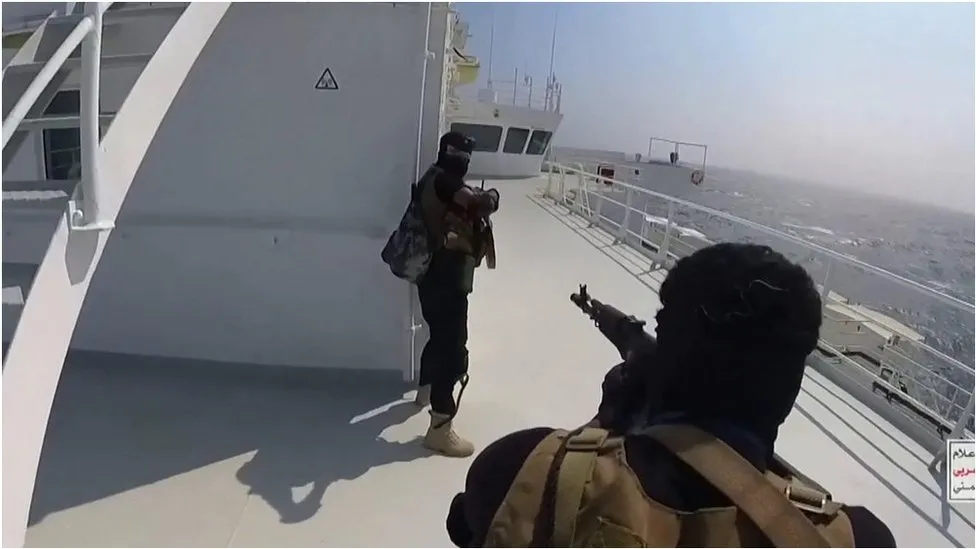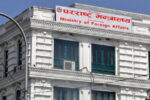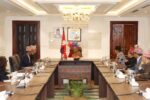YEMEN: The US and UK have carried out air strikes on Houthi targets in Yemen with the aim of deterring attacks on ships passing through the Red Sea.
The strikes were also backed by a number of the US and UK’s allies.
Missiles were launched overnight into Friday, hitting dozens of sites – with some casualties reported.
The Houthis say they are not deterred by the attacks, but the US suggests the strikes have damaged the rebel group’s military capability.
But the group has survived much worse – including years of being targeted by the Saudi Air Force.
This is what we know about the US-UK strikes so far.
Which targets were hit?
The US says it “executed deliberate strikes on over 60 targets at 16 Iranian-backed Houthi militant locations”.
The Pentagon described its targets as radar systems, drone storage and launch sites, missile storage and launch facilities and Houthi command and control nodes.
Strikes were reported in the Yemen capital Sanaa – which is controlled by the rebels – as well as the Houthi Red Sea port of Hodeidah, Dhamar and the group’s north-western stronghold of Saada.
According to the UK’s Ministry of Defence (MoD), the British strikes were in Bani in the north-west – which the MoD said was a drone operational site – and Abbs airfield, which intelligence said was a launching site for missiles and drones.
There were 72 strikes in all, according to the Houthis’ military spokesman.
Were there any casualties?
The Houthi spokesman also said five of its members had been killed and six others injured.
The Pentagon said the strikes were on military, not civilian targets using “precision weapons”.
What’s the strategy here?
US President Joe Biden has said he won’t hesitate to take further military action if necessary. But the US has also made clear that it does not want to see a widening conflict in the Middle East.
That suggests that any future US-led military action, if necessary, would again be limited.
Air strikes and long range cruise missiles are the least risky and costly for Mr Biden in an election year. Remember the US has been also using limited airstrikes to target other Iranian backed groups in Iraq and Syria in recent months.
But at best it’s a deterrent. It will not eliminate the threat.
The strikes last night might also have degraded and destroyed some of the Houthi’s ability to launch attacks on shipping in the Red Sea.
But in public, at least, they remain defiant. They still have the capacity to launch further attacks.
The only real option left for the US and UK is then doing more of the same – targeting from a distance. The US has bitter recent experience of more direct military action in the region – such as putting boots on the ground.
What weapons did the US and UK use?
The bulk of the firepower came from US jets. The US has an aircraft carrier in the Red Sea, as well as air bases in the region.
US Navy warships fired Tomahawk land attack cruise missiles, which are GPS-guided and can be programmed to fly evasively, the US military says.
While no specific figures have been given for how many missiles were fired, the US says more than 100 precision-guided munitions “of various types” were used.
Meanwhile, the UK said it sent four RAF Typhoons from Cyprus, carrying Paveway IV guided bombs. It has not said how many were released.
Though the Royal Navy has two warships in the Red Sea, neither can fire land attack missiles and so would not have been directly involved in the strikes.
How are the Houthis reacting?
Reacting to Friday’s strikes, the group’s leader Mohammed al-Bukhaiti said the US and UK would “soon realise” the action was “the greatest folly in their history”.
“America and Britain made a mistake in launching the war on Yemen because they did not benefit from their previous experiences,” he wrote on social media, adding “every individual in this world is faced with two choices – either to stand with the victims of genocide or to stand with its perpetrators.”
Another spokesman for the group said the US and UK were wrong to think they could deter Yemen’s support for Palestinians.
Iran, which backs the Houthis, has condemned the strikes on Yemen as a “clear violation of Yemen’s sovereignty and territorial integrity” and a violation of international laws.
A US senior administration official at the National Security Council said in a call on Thursday that “Iran is a primary, if not the primary enabler or supporter sponsor of the Houthis”, adding that they believe Iran has been “involved in every phase” of these attacks.
The Houthis’ position on the Red Sea attacks is that they are preventing ships affiliated with Israel from crossing the route – due to events in Gaza.
They have previously said that any ship destined for Israel or with Israeli links is a “legitimate target”. However, many commercial vessels that have been targeted appear to have no such connection.
“They are firing indiscriminately on vessels with global ties,” the US National Security Council official said. “Most of the ships that have come under attack have nothing whatsoever to do with Israel.”
How are Biden and Sunak justifying the strikes?
Mr Biden said the strikes were in “direct response” to the Houthi attacks in the Red Sea.
“These attacks have endangered US personnel, civilian mariners, and our partners, jeopardised trade, and threatened freedom of navigation,” he said.
UK Prime Minister Rishi Sunak added that the action was “necessary and proportionate” to protect global shipping.
“Despite the repeated warnings from the international community, the Houthis have continued to carry out attacks in the Red Sea, including against UK and US warships just this week,” he said. “This cannot stand.”
The US-UK attacks were backed by a coalition of Australia, Bahrain, Canada, Denmark, Germany, the Netherlands, New Zealand and South Korea.
The National Security Council official said “close calls”, one which recently nearly sunk a ship carrying US jet fuel, has caused “over a dozen shipping companies” to reroute vessels around the Cape of Good Hope, increasing costs and affecting the global economy.
In a statement, the allies said the multilateral strikes were conducted “in accordance with the inherent right of individual and collective self-defence”.
“These precision strikes were intended to disrupt and degrade the capabilities the Houthis use to threaten global trade and the lives of international mariners in one of the world’s most critical waterways,” the statement read.
BBC









Comment